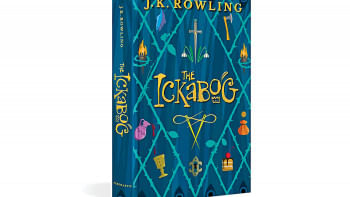JK Rowling’s 'The Running Grave': A souring tale that clumsily rolls downhill

Robert Galbraith, the nom de plume of JK Rowling, started her Cormoran Strike series with The Cuckoo's Calling a decade ago. The Running Grave is the seventh installment in the series and its title is taken from Dylan Thomas' poem, "When, Like a Running Grave". Like six of her previous Strike novels, the narrative is centered around the private detective Cormoran Strike and his intrepid assistant, Robin Ellacott, with whom Strike has a relationship that's not just a friendship—as we see in most of such fictional duos. Strike has feelings for Robin but Rowling always keeps their tension on the edge, never letting it spill out.
This time, the detective duo are assigned to extract William from an insidious cult, but simply kidnapping him won't cut it because other members of the cult who were kidnapped back to their own family have committed suicide. And so, Strike and Robin are tasked with an enormous undertaking—to take down and expose the influential Universal Humanitarian Church. The UHC is a massive organisation with powerful members and lawyers protecting it, so Robin goes undercover and becomes a member of the UHC to collect evidence in order to expose the Church.
Rowling takes hundreds of pages just to start the action. Her ponderous writing seems to take an eternity until Robin is inside the Church to collect evidence. Once inside, Robin gets to know the full length of the horror the members are forced to go through. The worst part is that the members are brainwashed to such an extent that they feel it is incumbent upon them to do the horrible things that an otherwise sane person would shudder even at the thought of.
In a few gruelling weeks, Robin collects evidence against the church, and as much as her time inside is mind bogglingly ghastly, Rowling's writing is no less dull and absurd. The absurdity reaches its zenith when Robin, an otherwise calm and rational character, telepathically feels that Strike has come to her rescue and runs to the place where Strike is waiting for her, when she's forced to "spirit bond" with Papa J, the head of the UHC.
With the help of Robin's collected evidence and testimony, and corroboration by some other members of the church who couldn't have been entirely brainwashed, Strike successfully gets the police to search the Chapman state, the home of UHC's primary centre.
It is certainly possible to read between the lines and find parallels with that of Rowling's personal life. The whole cult of The Humanitarian Church can be thought of as Rowling's views on the trans movement but it is frustrating, to say the least, to dwell on such things. Rowling speaks against them publicly and if she builds her fictional world with elements from her online brawls, then fine. But as a reader, I rightly want something riveting, and that's where Rowling fails.
She keeps taking detours from the central narrative time and again, and the bones of the plot get lost in the cloud of haze. There are at least 300-400 pages of extraneous jargon that should have been cut down. The Running Grave, then, would stand as a thrilling Strike novel, instead of the ponderous and jarring commingler that it is now.
I admire authors who keep something in their stories for the readers to work out. Rowling's whole Cormoran Strike series is the antithesis of the view that the readers aren't merely to be spoonfed. To the chagrin of the reader, she narrates the same course of events time and again with such minute detail that it veers into inanity.
The Running Grave might be the longest novel you'll read in a while and possibly the least remarkable one. Perhaps the generation of ours that grew up reading Harry Potter and dreamed of dwelling in the fantastical Hogwarts is better left with only those idyllic memories of reading Rowling. The Running Grave has no magic in it that enraptured me like in the Potter series; it, sadly, cast no spell on me, and instead I was left scratching my head in irritation, and being frustrated at page after page of what seemed like an unending, dull peregrination, resulting only in exasperation.
Entertaining, and enjoyable to some extent, without much profundity to it, Rowling's rollercoaster ride of a book offers little more than cheap thrills. But that is, after all, what Rowling, almost certainly, set out to achieve. Her tales are not meant to be mused over for weeks but to be gorged on until they turn sour.
Hilary Mantel, in her 1992 novel, A Place of Greater Safety, says, "Writing's like running downhill; can't stop if you want to." Rowling goes downhill without caring to stop for almost a thousand pages, and unlike Camille or Mantel, Rowling struggles to run downhill—she rolls down clumsily.
Najmus Sakib studies Linguistics at the University of Dhaka. Reach him on X at @sakib221b.

 For all latest news, follow The Daily Star's Google News channel.
For all latest news, follow The Daily Star's Google News channel. 








Comments